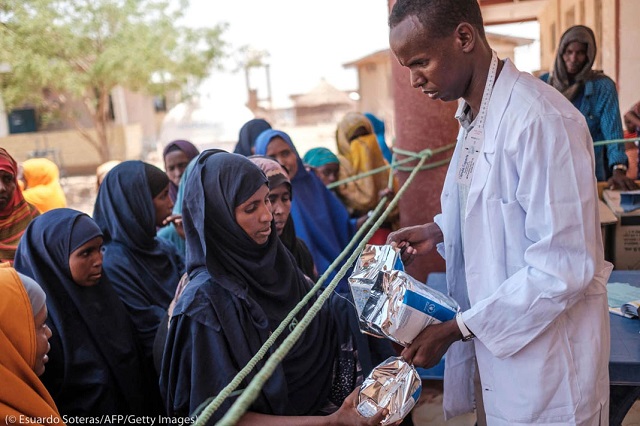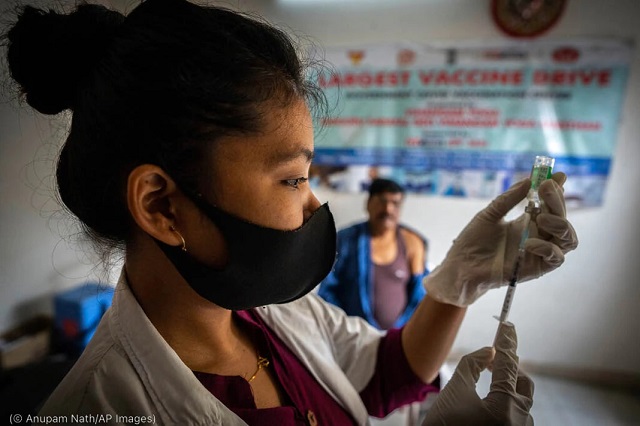The United States and partner nations are strengthening global supply chains to reduce current shortages of food, consumer goods and other products and prevent future disruptions.
Resilient supply chains are “vital to tackling virtually every pressing global challenge that we face,” Secretary of State Antony Blinken said at the July 20 Supply Chain Ministerial Forum. These include:
- Getting food from farms to the world’s hungry.
- Shipping vaccines and supplies to fight COVID-19 around the world.
- Producing wind turbines and other clean energy technologies to combat the climate crisis.
The COVID-19 pandemic disrupted global supply chains, causing product shortages ranging from clean energy technologies to semiconductors and pharmaceuticals. Russia’s full-scale invasion of Ukraine has blocked grain shipments and crippled food supply chains, worsening hunger for millions of people.

Russia’s unjust war against Ukraine has disrupted food supply chains, worsening famine in Africa. Above, a health worker in Ethiopia delivers nutrition packs April 6. (© Eduardo Soteras/AFP/Getty Images)
The meeting comes as the U.S. government is tackling these global crises. On July 18, it announced nearly $1.3 billion in additional humanitarian and development assistance for the Horn of Africa, where food supply shocks caused by Russia’s unjust war against Ukraine are worsening famine conditions in Ethiopia, Kenya and Somalia.
To fight the COVID-19 pandemic, the United States has already provided more than 565 million vaccine doses, part of a pledge to donate 1.2 billion COVID-19 vaccine doses worldwide.
International partnerships key
Blinken and U.S. Secretary of Commerce Gina Raimondo co-hosted the July 19–20 forum, partnering with more than a dozen economies and the European Union. The ministerial builds on President Biden’s October 2021 Supply Chain Summit with international partners.
In attendance were representatives from the EU and Australia, Brazil, Canada, the Democratic Republic of the Congo, France, Germany, India, Indonesia, Italy, Japan, Mexico, the Netherlands, South Korea, Singapore, Spain, the United Kingdom and the United States.
Blinken highlighted how international partnerships can overcome supply chain disruptions. When COVID-19 hit the United States, India sent medicine and vital supplies. Later, as cases spiked in India, the United States rushed medical oxygen and therapeutics there using the same supply chains.

The United States and India have each moved quickly to supply the other with health care supplies during the COVID-19 pandemic. A nurse prepares to administer a COVID-19 vaccine dose in Gauhati, India, April 10. (© Anupam Nath/AP Images)
Blinken said partners must build resilient supply chains to prevent future disruptions. Resilient supply chains are:
- Transparent so partners can share information and anticipate and respond to changes.
- Diversified so one supplier can replace another and no country can weaponize supply chains against other nations.
- Secure to reduce vulnerability to malicious cyber activity.
- Sustainable by adhering to environmental and labor standards that reflect shared values.
Raimondo said the U.S. government is working with industry and other partners to fix supply chain challenges at home, and with international partners through the U.S.-EU Trade and Technology Council and the Indo-Pacific Economic Framework.
“We’re making huge progress in both of these dialogues to make — to ensure that our supply chain is resilient, efficient, and benefits all of our citizens,” she said.
Blinken told the ministerial that “whether we’re addressing near‑ or long‑term challenges, there’s only one way to build supply chains that are resilient in all of these ways, and that’s to do it together, with partners.”
Banner image: The United States and other countries, including Germany, are strengthening supply chains to reduce product shortages. Above, cargo ships unload in Wismar, Germany, July 6. (© Jens Büttner/picture alliance/Getty Images)
The original article is here on ShareAmerica.







COMMENTS0
LEAVE A COMMENT
TOP